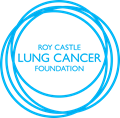Story
WHEN MY DAD, Brian Norquoy complained of back pain in 2019, we never imagined for a second that we would lose him to lung cancer — just over five weeks later.
By the time he had received his diagnosis, it was sadly too late to fight. Dad died 13 days later, aged just 62, having welcomed a new grandson, my son Isaac, only weeks before.
Four years on from what was a massive shock for my family, I am preparing to run the London Marathon next year in aid of the Roy Castle Lung Cancer Foundation.
After our experience, I want to raise awareness of the symptoms of lung cancer, and vital funds for a charity which is working hard to save and prolong lives, by ensuring early diagnosis.
Dad had no other symptoms than a sore back and sides. It is a truly scary hidden form of cancer and sometimes, like with Dad, it is just too late to do anything about it. Losing him so suddenly was a huge shock, and left my family devastated.
My instinct in the moment was to focus firmly on my new baby son Isaac, and my mum Caroline, and I used running as a way to tackle my own grief. It lets me clear my head and forget about any stresses or worries of the day. I must have been in shock for a good six months — but running got me through.
I'm a busy mum, working at The Orcadian as a designer, and I have devoted my spare time I the years since losing Dad, to running Kirkwall half marathons, Harray half marathons, Rousay half marathons, some local 10ks, and many social runs with my fantastic running friends. They keep me plodding away and give me so much support along the way. In October 2022, I took on the Loch Ness marathon which was my first, and it was absolutely fantastic.
Now, I have launched my campaign to attract sponsorship and donations for the Royal Castle Lung Cancer Foundation, and as I get set to take on my biggest challenge yet, the London Marathon 2024, I am appealing to local businesses and individuals for support.
Please donate if you can – this charity supports everyone affected by lung cancer — from diagnosis, through treatment, living with the disease and end-of-life care. It raises awareness, prevents future generations from getting it, and challenges the misconceptions of lung cancer, so that those diagnosed can live well with lung cancer for as long as possible.
Thank you in advance, and please look out for further news on my campaign, in a special column documenting my training journey, launching in The Orcadian newspaper in January.
By the time he had received his diagnosis, it was sadly too late to fight. Dad died 13 days later, aged just 62, having welcomed a new grandson, my son Isaac, only weeks before.
Four years on from what was a massive shock for my family, I am preparing to run the London Marathon next year in aid of the Roy Castle Lung Cancer Foundation.
After our experience, I want to raise awareness of the symptoms of lung cancer, and vital funds for a charity which is working hard to save and prolong lives, by ensuring early diagnosis.
Dad had no other symptoms than a sore back and sides. It is a truly scary hidden form of cancer and sometimes, like with Dad, it is just too late to do anything about it. Losing him so suddenly was a huge shock, and left my family devastated.
My instinct in the moment was to focus firmly on my new baby son Isaac, and my mum Caroline, and I used running as a way to tackle my own grief. It lets me clear my head and forget about any stresses or worries of the day. I must have been in shock for a good six months — but running got me through.
I'm a busy mum, working at The Orcadian as a designer, and I have devoted my spare time I the years since losing Dad, to running Kirkwall half marathons, Harray half marathons, Rousay half marathons, some local 10ks, and many social runs with my fantastic running friends. They keep me plodding away and give me so much support along the way. In October 2022, I took on the Loch Ness marathon which was my first, and it was absolutely fantastic.
Now, I have launched my campaign to attract sponsorship and donations for the Royal Castle Lung Cancer Foundation, and as I get set to take on my biggest challenge yet, the London Marathon 2024, I am appealing to local businesses and individuals for support.
Please donate if you can – this charity supports everyone affected by lung cancer — from diagnosis, through treatment, living with the disease and end-of-life care. It raises awareness, prevents future generations from getting it, and challenges the misconceptions of lung cancer, so that those diagnosed can live well with lung cancer for as long as possible.
Thank you in advance, and please look out for further news on my campaign, in a special column documenting my training journey, launching in The Orcadian newspaper in January.
